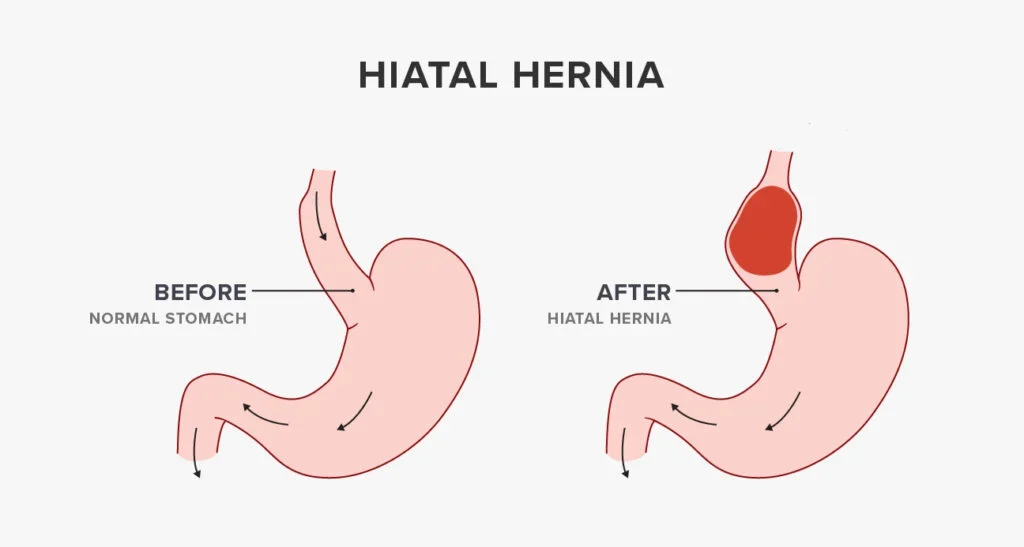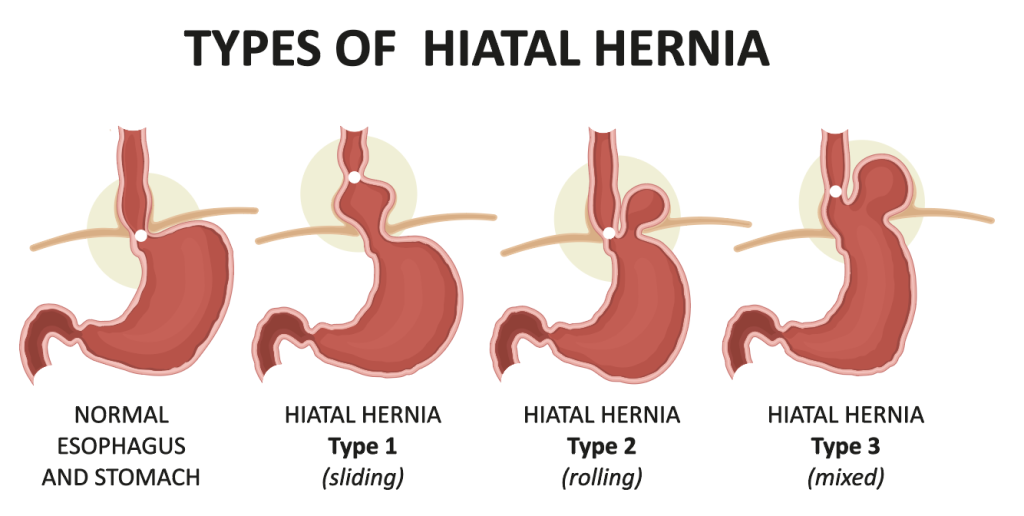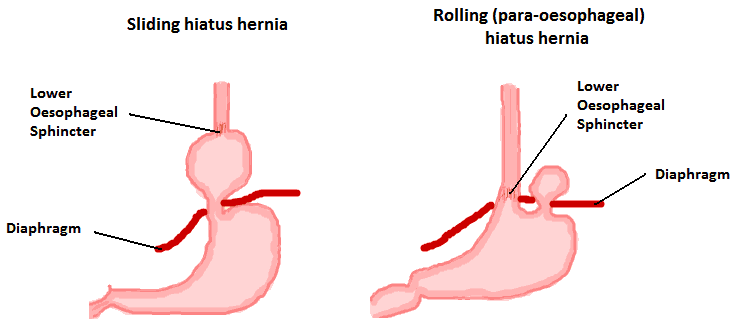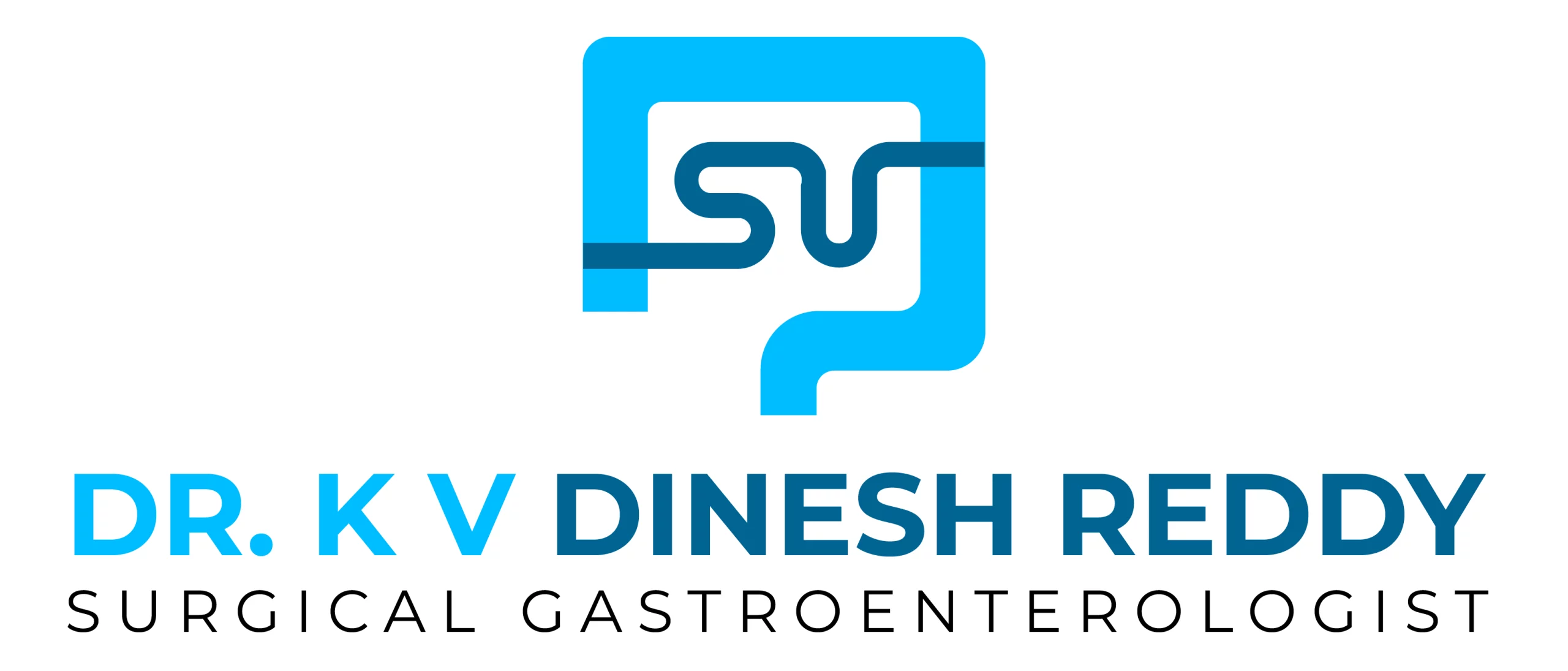Hiatal Hernia Treatment in Hyderabad

Hiatal hernia, a digestive disorder that is more commonly seen than it is thought of, especially in older adults. Around 55–60% of adults over 50 have a hiatal hernia, but only 9% show symptoms. Of those with symptoms, only a small percentage need surgery.
If you or your loved one is suffering from this condition and looking for the best hiatal hernia surgeon in Hyderabad, consult Dr. K.V. Dinesh Reddy.
Dr. Reddy is known for his expertise in laparoscopic hiatus hernia repair in Hyderabad and robotic hernia repair in Hyderabad.
Read on to learn more about hiatal hernia treatment in Hyderabad.
What is a Hiatal Hernia?
A hiatal hernia occurs when the upper part of your stomach pushes up into your chest through an opening in your diaphragm. The diaphragm is a large muscle that helps in breathing and is present between your abdomen and chest, and the opening present in it is called the hiatus. Through this opening, the oesophagus (a tube used for swallowing) passes to connect to your stomach. When there is constant stress and strain over time, the opening widens, causing the stomach to bulge out through it. So, the disorder is called a hiatus hernia.
Types of Hiatal Hernia - Hiatal Hernia Treatment in Hyderabad

1. Sliding Hiatal Hernia
This is the most common type (around 95% cases) which usually causes no symptoms. In this type, the junction where your oesophagus and stomach meet slides up through the widened hiatus into the chest cavity at times and then slides back down.
2. Rolling Hiatal Hernia
This type is less common but can be more serious. It is also known as a para-oesophageal hiatus hernia. In this type, the upper part of your stomach rolls up into your chest cavity through the hiatus. It sits next to the oesophagus and forms a bulge.

What Are The Symptoms of Hiatal Hernia?
A small hiatal hernia mostly causes no symptoms; there is also no bulge visible from the outside. You may never know you have one unless diagnosed by your doctor while checking for another condition. But larger hiatal hernias may cause the following symptoms:
- Heartburn
- Acid reflux (acid rising back into your throat)
- Sore throat and hoarseness
- Excessive burping
- Regurgitation (sensation of food or liquid flowing back into your mouth)
- Chest pain
- Shortness of breath
- Difficulty in swallowing
- Abdominal pain
- Bloating
- Feeling full soon after eating
- Vomiting of blood
- Passing black stools, indicating bleeding in your digestive tract
What Causes Hiatal Hernia?
The reason why hiatal hernia happens is not clear. While most hernias occur due to a weakened spot in the tissue that creates an opening for the hernia to come through, a hiatal hernia occurs through an already existing opening (the oesophagal opening through the diaphragm). When this opening widens, a hiatal hernia occurs. It could widen due to:
- Congenital defect
- Age-related changes in your diaphragm
- Abdominal injury or certain surgeries
- Constant and intense rise in pressure in your belly and on the surrounding muscles, often resulting from chronic coughing, strained bowel movements, pregnancy, obesity, or lifting heavy objects.
How is it diagnosed?

To diagnose a hiatal hernia, your doctor might advise a few of the following tests:
-
Barium swallow
In this test, you are given a contrast liquid containing barium to drink. This coats the lining of your oesophagus and stomach and shows up on an X-ray. Then the doctor takes X-ray images to visualize the location of the hernia.
-
Upper endoscopy
In this procedure a thin, flexible tube with a camera is used to examine your esophagus and stomach to check for any inflammation.
-
Esophageal manometry (pressure study)
This test measures the strength and pattern of muscle contractions in your oesophagus. It helps determine how well the oesophagus is working and if there are any abnormalities.
-
Esophagram
This is a type of video X-ray that shows real-time video images of your oesophagus.
-
pH test
This measures the amount of acid levels in your oesophagus.
Best Treatment Options For Hiatal Hernia in Hyderabad
Most people with a hiatal hernia don’t need treatment if they don’t have symptoms. However, for larger hiatal hernias or those causing symptoms, treatment options include:
Medications
While there are no specific medications to treat a hiatal hernia directly, doctors may prescribe drugs to relieve symptoms. These might include:
- Antacids: To neutralize stomach acid.
- Acid Blockers: To reduce acid production and help heal the esophagus.
- Proton Pump Inhibitors (PPIs): To further reduce stomach acid.
Lifestyle Changes
Best hiatal hernia surgeon in Hyderabad may recommend changes to manage symptoms, such as:
Diet Adjustments: Avoiding foods that trigger acid reflux and eating smaller, more frequent meals.
Avoid Eating Before Bed: Not eating within a few hours of lying down.
Weight Loss and Exercise: Maintaining a healthy weight and staying active can help reduce symptoms.
Hiatal Hernia Surgery in Hyderabad
Open Surgery: This is the traditional approach in which a large incision is made in the abdomen. The surgeon then repositions the stomach and manually wraps it around the lower part of the oesophagus to secure it in place.
Laparoscopic Hernia Repair in Hyderabad : This is the most common approach today and is minimally invasive. It is also known as keyhole surgery which is done using a laproscope. The surgeon closes the hole in your diaphragm where the hernia came through by tightening the connection between your upper part of your stomach called the fundus and your lower esophagus. This procedure is known as fundoplication.
This technique typically results in less pain, a shorter hospital stay, and a faster recovery time compared to open surgery.
If you have a hiatal hernia and it is not causing any trouble, there is no need to worry. But, if the hernia is large or your symptoms, especially acid reflux, are severe, then consult the best hiatal hernia surgeon in Hyderabad, Dr. K.V. Dinesh Reddy.
Once the diagnosis is confirmed, relief from symptoms is easily managed with diet and lifestyle changes. If you require hiatal hernia surgery, it is also not a cause for concern. These days, advanced technologies like robotic hiatal hernia repair surgery in Hyderabad have made surgeries more accurate, safe, and predictable, with reduced surgical time and faster recovery.
While fatty liver disease is a serious condition, it is often reversible with lifestyle modifications and proper medical care. With early diagnosis and proper treatment, you can successfully manage the condition and prevent its complications.
If you are experiencing any of the above symptoms or suspect that you may have fatty liver disease, consult Dr. K V Dinesh Reddy to get the best fatty liver treatment in Hyderabad.
We hope that this article helped you gain all the information you needed to know for Fatty Liver Treatment in Hyderabad, thanks for reading!
Best Gastroenterologist in Hyderabad

Dr. K V Dinesh Reddy
MBBS; MS (Gen.Surg); DNB (Surg.Gastro)
Dr. K V Dinesh Reddy is a highly experienced gastroenterologist with more than ten years of experience.
He strongly believes that surgery should only be considered as a last resort and prefers a holistic approach to treatment. So, if a disease can be effectively treated with medication, he never recommends surgery.
Frequently Asked Questions
Here are answers to some of the questions you might have about Fatty Liver
Yes, fatty liver can often be reversed through lifestyle changes. Fatty liver happens when fat accumulates in liver cells. By adopting a healthier diet, exercising regularly, and managing weight, you can reduce the fat in your liver and improve its function. Avoiding excessive alcohol consumption is also crucial. These changes can help the liver heal and return to a healthier state. However, if left untreated, fatty liver can lead to more serious conditions. It’s important to consult a healthcare professional for guidance and regular check-ups to monitor your liver health and ensure your efforts are effective.
No, alcoholic fatty liver and non-alcoholic fatty liver are not the same. Alcoholic fatty liver is caused by excessive alcohol consumption, which leads to fat buildup in the liver. Non-alcoholic fatty liver (NAFLD) is when fat accumulates in the liver in people who drink little to no alcohol. Both conditions can progress to more serious liver issues if not managed, but their causes are different. NAFLD is often linked to factors like obesity, high cholesterol, and insulin resistance. It’s important to address the underlying causes of each type and work with a healthcare provider to prevent complications and promote liver health.
Yes, if you have fatty liver, it’s a good idea to avoid certain foods. Sugary foods and drinks, like sodas and sweets, can worsen the condition. High-fat foods, especially fried and processed ones, should be limited. Cut down on red meat and opt for lean proteins like fish and chicken. Minimize salt intake to help prevent fluid buildup. Alcohol should be avoided or consumed in moderation. Instead, focus on a balanced diet rich in fruits, vegetables, whole grains, and lean proteins. Drinking plenty of water and maintaining a healthy weight can also support your liver health. Remember, consulting your healthcare provider for personalized guidance is important.
Yes, having fatty liver can increase the risk of developing liver cancer. Fatty liver is a condition where fat accumulates in liver cells. Over time, if left untreated, it can progress to more serious liver diseases, including cirrhosis, which further raises the risk of liver cancer. The inflammation and damage caused by fatty liver can contribute to the development of cancerous cells. However, not everyone with fatty liver will develop cancer. Managing fatty liver through a healthy lifestyle, regular medical check-ups, and following your doctor’s advice can help reduce the risk of complications, including liver cancer.
Yes, there is a connection between fatty liver and diabetes. Fatty liver can make the body less sensitive to insulin, a hormone that controls blood sugar levels. This can lead to higher levels of sugar in the blood, increasing the risk of type 2 diabetes. Likewise, diabetes can contribute to the development of fatty liver. These conditions often go hand-in-hand, creating a cycle where one can worsen the other. Managing a healthy weight, eating well, exercising, and controlling blood sugar levels can help break this cycle and reduce the risk of both fatty liver and diabetes. Regular medical check-ups are important for monitoring and addressing these concerns.


